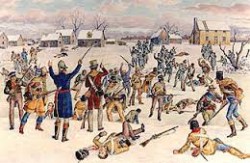On January, 1893 the first train steamed into the stately old Union Depot in downtown Detroit.
No, not that abandoned train station you see on all the ruin porn web sites.
You know, Detroit’s other train station. More than 10,000 people were estimated to have dropped by the depot for a peek. Legendary Mayor Hazen S. Pingree was among the masses, showing up in a “great fur coat.”
The trains kept coming and going for the next half century, but times would change. As cars and planes made passenger trains obsolete, train stations closed one by one.
After the legendary Wabash Cannonball bowled out of the Union Depot for the last time on April 30, 1971, boards were nailed over the station’s windows and doors the next day.
Despite a last-minute Hail Mary preservation attempt, the building would be destroyed in January 1974. The rails would be ripped up and replaced with miles of concrete for the Lodge. And another once-proud Detroit landmark became largely relegated to the dustbin of history.
The Wayne County Community College District has a building on the site of the depot now.
For the full article, see Dan Austin, “The day Detroit’s ‘other’ train station opened its doors”, Detroit Free Press, January 21, 2015.
For a longer version, see Dan Austin, Union Depot, HistoricDetroit.org Blog.
Kiwanis International, one of the great service organizations of the world, had its origin on January 21, 1915. On this date the State of Michigan issued a charter to a group of business and professional men who organized the first Kiwanis Club on this site in the old Griswold Hotel. The club’s name, Kiwanis, was an Indian term. The concept and principle which Kiwanis represents is symbolized by the slogan “We build.” From this beginning, and within two years, Kiwanis became international in scope.
The original members, Detroit merchants and professionals, planned to call themselves the Benevolent Order Brothers. The name, though, was nixed when one member pointed out the difficulty in recruiting members to a club called BOB. Instead, they adopted the name Kiwanis, an American-Indian word for the phrase “we share our talents.”
Sources :
Michigan Markers, erected in 1964.
Emily Hopcian, This Week in Michigan History, Detroit Free Press, January 20, 2008, B.4.
Sam Stall, “Kiwanis International : It All Began in Detroit”, Michigan History, March/April 2015, pp.25-29.
It was the Age of Aquarius. Or maybe not.
Late in January, the University Activity Center sponsored a two-week Creative Arts Festival. One of the sponsored plays, Dionysus 69, fresh from New York City, was shut down by the police, and 10 actors and actresses were arrested for public indecency.
Dionysus 69 was a modern day adaptation of Euripedes play The Bacchae. It follows Dionysius, the god of wine, in his successful attempt to lead the women of Thebes into a wild celebration which is carried to far. In the end, Pentheus, King of Thebes, is killed by his mother in a mad frenzy.
The one and only performance was held at the Michigan Union, with 600 attending, and 200 turned away at the doors.
Unfortunately, the play featured two nude scenes and complaints were received. One such complaint came from State Senator George Kuhn of Birmingham who believed no such play should be produced on a state university campus. Kuhn was responding to newspaper coverage of nudity and failed to appreciate artistic license.
A Dionysus Litigation Fund was set up by the University Activity Center to fight the charges.
Sources:
Michigan History, January-February 2016
Michigan Alumnus, March 1969, Vol. 75, no. 7, pp.10-11.
Not many businesses can say they have been around since the early 1900s, but not many businesses are like Koegel Meat Company.
Albert Koegel came to the Flint area in 1916 to start his own business. Albert’s dream turned into reality after talking with a salesman from Armour Foods. The salesman told Mr. Koegel that if he moved to Flint, Michigan, that he would stand a good chance of making the business work, due to the projected growth of the automobile industry.
By the mid 1930s, Albert had built up enough business to construct a plant to produce his meat products. He employed just a handful of workers, nothing compared to the nearly one hundred people employed today. As the number of employees increased, so did sales and the product line.
Another unique aspect of Koegel Meats business is that they deliver to each individual store. Delivering to each store allows Koegel to place a shelf life on its products which is approximately half of its competitors. This helps to ensure that the end customer is eating a fresh product.
In 1972, Albert Koegel’s son built a new manufacturing plant just off Bristol Road, near Bishop Airport in Flint, Michigan. Koegel’s moved in on January 21, 1972. This location has proven to be beneficial due to its proximity to I-75 and I-69.
Source : History of Koegel’s Meats
Who gave the best farewell speech ever in the Michigan Legislature? Oh, without question the speech of former Senate Democratic leader William Faust in December 1994. It was the best. And in so many ways it was also the saddest.
Mr. Faust had been elected to the Senate in 1966, after owning several small newspapers in the Downriver area and serving in local government. He spent many years growing up in Lansing, where he said he played ping pong with a teenaged boy who would go on to be known to the world as Malcolm X.
In 1966, Mr. Faust was terribly injured in a car crash and spent the rest of his life in a wheelchair. In the late 1970s, he was elected the Senate majority leader, ably keeping in line a caucus of intense personalities. When two recalls in 1983 and subsequent special elections in 1984 put Republicans in charge of the chamber, he served as minority leader for several years, hoping to win back control of the chamber and resigning as leader when that effort failed.
He was passionate about Michigan’s state library. He played a key role in the restoration of the Capitol, saving some of the original glass panels from the Senate ceiling that were being hurled into dumpsters by workers.
And while he was always seen as an almost courtly gentleman, Mr. Faust could be tough. He led the Senate to reject some appointments by then Governor William Milliken. When Mr. Milliken told him that appointments were his domain, Mr. Faust snapped back the Senate could reject a nominee because they didn’t like the color of his tie.
Mr. Faust also knew the Constitution and law, and whenever there was a difference between legislators on the Constitution, he almost always won. In his last interview before he left office, he said the one piece of advice he would give a new lawmaker was to read the Constitution. Don’t they now, the reporter asked. No, he said.
So, what would you think Mr. Faust would say in his farewell address on the last session day of 1994, before he prepared to retire to a house he had retrofitted Up North? After 28 years, after seeing some of the most momentous legislative changes in state history, after serving as leader for a number of those years, what would someone like that say in farewell?
This is what he said, this is the entire farewell: “I want to thank the members for all the many courtesies they have shown me, and I want to thank the folks back home for 28 great years.”
There you have it. A total of 28 words expressing one salient thought: gratitude. Who can say more or better than that?
But while it was the best farewell speech ever, it was also possibly the saddest. That last day in session, Mr. Faust began to suffer chest pains. He was taken to the hospital, and never left. He had coronary bypass surgery and his gall bladder removed, but nearly 30 years in a wheelchair had left his system too weak to fight off infection. Bill Faust died on January 21, 1995.
And as grateful as he was, those who remember him know they were the ones who were truly grateful.
For the full posting, see John Lindsgtrom, “The Sad Story Of The Best Legislative Farewell Speech Ever”, Gongwer Blog, December, 3 2014
Democratic-nominated Michigan Supreme Court Justice Diane Hathaway resigned in 2013 after an ethics complaint was filed against her. She was subsequently sentenced to one year in prison for bank fraud after hiding assets to allow for a short sale on her Grosse Pointe home.
Sources:
“Hathaway Pleads Guilty To Felony”, Inside MIRS Today, January 29, 2013.
Emily Lawler, “Deaths, drugs and skullduggery: A brief history of Michigan political scandals“, MLive, August 21, 2015; Updated August 24, 2015.
Democratic-nominated Michigan Supreme Court Justice Diane Hathaway (right) resigned in 2013 after an ethics complaint was filed against her. She was subsequently sentenced to one year in prison for bank fraud after hiding assets to allow for a short sale on her Grosse Pointe home.
Sources:
“Hathaway Pleads Guilty To Felony”, Inside MIRS Today, January 29, 2013.
Emily Lawler, “Deaths, drugs and skullduggery: A brief history of Michigan political scandals“, MLive, August 21, 2015; Updated August 24, 2015.

Sincere Smith, 2, became the national face of the Flint water crisis today after Time magazine put the rashed toddler’s picture on its cover with the headline, “The Poisoning Of An American City.”
Detroit Free Press photographer Regine H. Boone took the picture for Time, telling the national weekly that Smith’s mother actually fears giving the boy baths, even though its done with bottled water, not with the lead-tainted municipal water.
“This boy actually fears the water,” Boone told Time. “It’s like Kryptonite to him: he starts screaming. His mother says it’s burning him and when he’s in pain, the whole family is in pain.”
Quotes from the issue: Mona Hanna-Attisha, a Flint pediatrician and assistant professor of pediatrics at Michigan State University whose research confirmed the rising lead levels, has since been praised for her work. … For almost five years, Flint has been effectively run by a series of unelected officials appointed by the governor. “The state was in charge of the city,” says Eric Scorsone, a professor of government at Michigan State University and an expert in the state’s emergency-management law. “So the state kind of has to own the problem.”
Josh Sanburn, “The Poisoning of An American City”, Time, January 21, 2016. Article embargoed for one week then it will be available through the MSU Libraries online catalog.
Olivier Laurent, “Photographing Flint’s Water Crisis From the Inside”, Time Lightbox Behind the Photos, Jan. 21, 2016.

Who knew? Squirrel Appreciation Day is here; like them or not.
January 21st is the day to look at America’s favorite rodent as something other than pancake-flat road kill, a clever feeder-robber or free entertainment for a frustrated window watching cat. Take time today to appreciate their adaptability and ability to not just survive but thrive in our midst.
This slightly nutty ‘holiday’ is saluted by the National Wildlife Federation and was founded in 2001 by Christy Hargrove, a wildlife rehabilitator in North Carolina. Despite the fact that many fail to look both ways before crossing a highway even squirrel haters should salute these creatures that bury nuts; helping to spread trees to areas where the nut did not fall.
Sources:
National Squirrel Appreciation Day, Jonathan Schecter’s Earth Almanac Blog, reposted by Oakland Press, January 20, 2014.
January 21st is National Squirrel Appreciation Day, Michigan in Pictures, January 21, 2015.
Although American Brigadier-General Winchester’s American forces easily captured Frenchtown on January 18th, they were not prepared for the harsh northern winter and chose to remain there to recuperate and await reinforcement by General Harrison. They also failed to take proper measures to guard against a possible counterattack.
As a result, British troops with strong Indian support were able to counteratack on January 22, 1813 with success.

 Painting by Hal Sherman of Englewood, Ohio depicting Winchester’s surrender of the Kentucky Troops at River Raisin. The painting depicts Wyandot Chief Roundhead presenting General Winchester to Proctor.
Painting by Hal Sherman of Englewood, Ohio depicting Winchester’s surrender of the Kentucky Troops at River Raisin. The painting depicts Wyandot Chief Roundhead presenting General Winchester to Proctor.
Sources :
Battle of Frenchtown wikipedia entry
Historical Society of Michigan
River Raisin Battlefield : Remember the Raisin
An Account of the War of 1812 by the Kentucky National Guard.
January 22, 1813 by the Michigan Department of Natural Resources.
River Raisin markers and article posted on Military Detroit.
“The War of 1812 comes to Michigan”, Detroit Free Press, January 22, 2012.
“Michigan at War: The Struggle for the Old Northwest, 1812-1815,” a documentary produced by the Michigan Commission on the Commemoration of the Bicentennial of the War of 1812, has been posted for free access on MI Streamnet through a partnership with Wayne Regional Educational Services Agency.
War of 1812 PBS film DVD on order.




